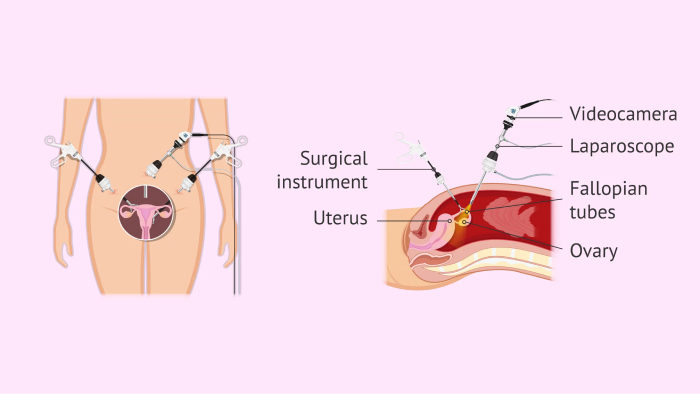Laparoscopic endometriosis surgery
Home > Treatments > Laparoscopic endometriosis surgery

The pain caused by endometriosis can have a significant effect on your quality of life. This can be especially frustrating if medications don’t appear to be helping.
For some people with endometriosis, surgery may be an option. But it can be difficult to know what to expect from surgery — and whether it’s the right decision for you.
Endometriosis is a chronic, noncancerous condition where cells that resemble the uterus lining, called endometrial cells, grow outside the uterus. The endometrial-like tissue appears in areas like the ovaries, abdomen, and bowel.
This misplaced tissue can cause symptoms like pain that can occur during your period, sexual intercourse, or bowel movements. Having endometriosis can also make it harder for you to get pregnant.
Your doctor might recommend surgery if:
You have severe pain. Because endometrial-like tissue grows where it doesn’t belong, endometriosis can impact surrounding tissues. This leads to pain and inflammation. Sometimes pain can be severe and significantly interfere with your daily activities.
Medications haven’t helped. Hormone therapy and pain medications can often help to relieve symptoms in some stages of endometriosis. However, some stages of endometriosis don’t respond well to medications.
You’ve been trying to get pregnant. Endometriosis can cause damage to eggs. In severe cases, scar tissue from endometriosis can block the fallopian tubes. This can make it harder for someone with endometriosis to conceive.
Talk over all of your options with your doctor. Weigh the pros and cons of each one. It’s also helpful to get a second opinion.
Here are some answers to questions you may have about surgery for endometriosis.
Doctors use two main treatments for endometriosis: medicine and surgery. Your doctor will first try to treat your endometriosis with medications.
For someone with mild symptoms, pain relievers like ibuprofen (Advil, Motrin) can be enough to control symptoms of pain. But these medications won’t slow the growth of cells.
For others, Progesterone - Dienogest, birth control pills or gonadotropin-releasing hormone agonists can prevent endometrial-like tissue from growing outside the uterus.
When surgery is recommended, doctors perform two main types to treat endometriosis. We’ll examine each of these in more detail below.
Prior to your surgery, your doctor will give you specific guidelines about when to stop eating and drinking. You may also need to stop taking some types of medication.
Be sure to follow your doctor’s guidelines carefully so that your procedure can proceed as scheduled.
Laparoscopy is a type of minimally invasive surgery. It uses a small, slender camera called a laparoscope and only requires small incisions to see into the abdomen.
Laparoscopy is performed under general anesthesia. That means that you’ll be asleep while the procedure is being performed and won’t feel pain.
The surgeon may use one of the following surgical techniques to remove endometrial-like tissue:
Excision. During an excision, the tissue is cut out.
Ablation. During an ablation, the tissue is destroyed using freezing, heating, electricity, or laser beams.
During laparoscopy, the following things will happen:
You should be able to go home on the next day of your surgery.
Please complete the form below to give us a bit of information about your needs. We will contact you as soon as possible to discuss how Dr Anupma Chopra Gynae & Fertility Specialist team can help you meet your goals.
.Our clinic is honoured to have provided complete care to thousands of patients seeking Gynae and Fertility related troubles.
Appoinment© 2022 Design and Developed by Duplex Technologies
Start Consultation with DR. ANUPMA CHOPRA +919914120992